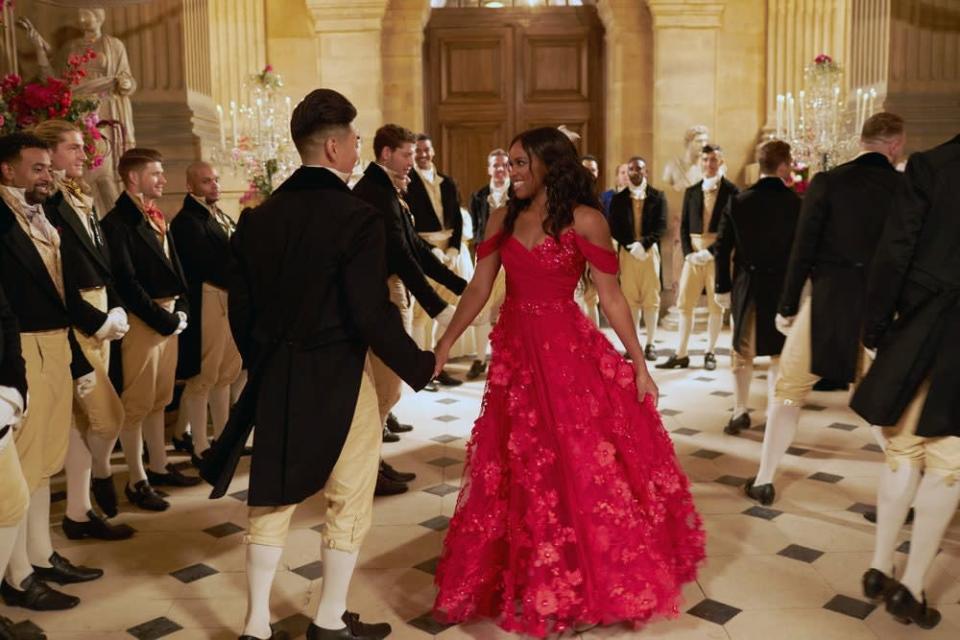When did I know that I loved The Courtship, NBC’s bonkers and highly enjoyable new dating show in which 16 men move into a castle, cosplay as Jane Austen characters, and try to date a software engineer?
Was it when the heroine–Nicole Remy, 26, NFL-cheerleader turned programer–arrived at her castle in a horse-drawn carriage as a string quartet played “Don’t Stop Believin”? Was it the moment when a suitor looked around Castle Howard—the same estate where Bridgerton filmed the home of Simon, Duke of Hastings (Regé-Jean Page)—and muttered, “Where can I get a corndog around here?” Was it when Remy, trying to describe a suitor with extravagantly styled eyebrows, used the one phrase that would have improved Jane Austen’s great prose? (“He’s kind of…a lot.”)
Let me be clear: Nothing makes me feel more insane than when women are nostalgic for the courtship traditions of the past, particularly in the period when Bridgerton and Austen’s novels are set. “Modern dating is not working for me,” Remy explains, articulating an argument I have heard from thousands of women in person and online. “Courtship these days doesn’t happen. It’s really like–they’re picking you up on a dating app, and there’s not the romance that you’re looking for.” A voiceover in the first episode describes 19th-century England as, “The most romantic period in history.”
Sisters, friends, fellow soldiers in the “hey hows it going” trenches, I hear you, and I am with you. Dating men is often bad. But it is not “I would give up my civil rights to avoid this” bad. When we pine for Austen’s time, we pine for a time when women were legally subordinate, the slave trade raged, and child labor and colonial exploitation facilitated an economy that makes today’s income inequality seem cute in comparison. “There was no respectable way for women to earn money,” Austen scholar Juliette Wells, a professor at Goucher College, tells Glamour. Remember that Austen herself—a cool, funny, genius—was relatively poor and stayed single her entire life.
The idea that women at the time were surrounded by suitors from whom they could pick a lifelong lover is a fallacy, Wells says. “A woman’s choice was to say yes or no to a man, once he actually proposed,” says Wells. “Men judged women according to their beauty and level of wealth; being intelligent or witty wasn’t necessarily an asset.” A bad marriage was a life sentence. (“Divorce was virtually unobtainable,” says Wells.) Most of us imagined that had we would have spent our time verbally sparring with Mr. Darcy at a ball. There’s a range, but economists tend to estimate that Austen characters were between the 1% and the .1%. We really, really are better off now, even as we wait for a text back from a guy named Rick who “looooves” to travel.
It is possible to know all these things and still adore The Courtship. You just have to see it as a psychosexual adult dress up game, which is exactly what all dating shows are anyway. It’s an elaborate erotic role play, funded by a major network, that casts a certain kind of female gaze on modern heterosexual dating. A broad fantasy, the show fulfills a need: to see straight men embarrassing themselves. In one scene the suitors have to beg Remy for her attention as they perform memorized dance moves. NBC only released the first episode of the show to reviewers ahead of the premiere, but that one episode is possibly the most fun I have ever had watching reality TV.

The Courtship directly riffs on The Bachelor and The Bachelorette—contestants demand to know whether others are “there for the right reasons,” they’re obsessed with stealing Remy away for “one-on-one time,” and they get sent home in tears. The Bachelor franchises have an uncanny, sticky feeling; they’re shows about finding “something real,” but they tend to feel fake. Adding ball gowns, breaches, and made-up etiquette improves things immensely. As does adding the heroine’s parents, best friend, and sister, who watch Remy date from the sidelines, providing gossipy, loving, commentary. (“I want to like him, I wish he was a little bit less of a personality,” says Remy’s best friend, channeling the spirit of Elizabeth Bennet.)
And it’s deeply gratifying to see a Black woman be a protagonist in a story that–both historically and in modern fantasy versions—excluded and degraded women of color. Remy is the perfect heroine in every sense: accomplished and lovely and f
unny and kind and occasionally moved to sing her feelings. On night one, Remy performs a choreographed partnered dance with the bottom three men, taking the opportunity to whisper constructive feedback to each of them. “I appreciate humor,” she instructs a stunned doctor, twirling in his arms, “but sometimes it’s gimmicky.” At the ball, in another suitor’s embrace, she murmurs, “Obviously I’m attracted to you. I just feel like I need you to show me a little bit more flirtatiousness.” He looks nearly speechless. “I can do that,” he mumbles.
“Anything that points new audiences towards Austen is potentially a good thing, in my view,” says Wells. Amen to that. When modern malaise calls and even a blessed hour away from Zoom won’t do, consider The Courtship when it premieres this Sunday, March 6 on NBC.
Jenny Singer is a staff writer for Glamour. You can follow her on Twitter.
Originally Appeared on Glamour




